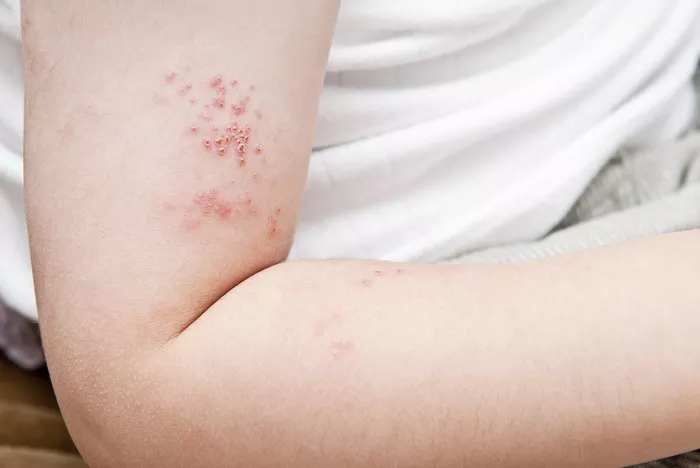Skin conditions can often present similar symptoms, making it challenging to differentiate between them. Eczema and fungal infections are two common dermatological issues that can cause discomfort and affect the quality of life. While they may share some similarities in symptoms, understanding their differences is crucial for accurate diagnosis and effective treatment. In this article, we will explore eczema and fungal infections, comparing their causes, symptoms, diagnosis, and treatment options to facilitate better management and care for individuals affected by these conditions.
Understanding Eczema:
Eczema, also known as atopic dermatitis, is a chronic inflammatory skin condition characterized by dry, itchy, red, and inflamed patches on the skin. It often begins in childhood but can persist into adulthood. Eczema is believed to be caused by a combination of genetic, environmental, and immune system factors. Factors such as dry skin, environmental triggers (like pollen or pet dander), stress, and certain foods can exacerbate eczema symptoms.
Understanding Fungal Infections:
Fungal infections of the skin, commonly referred to as dermatophytosis or tinea, are caused by various fungi that thrive in warm, moist environments. These infections can affect different areas of the body, including the feet (athlete’s foot), groin (jock itch), scalp (tinea capitis), and body (ringworm). Fungal infections are highly contagious and can spread through direct contact with infected individuals or contaminated surfaces. Factors such as poor hygiene, excessive sweating, and compromised immune function can increase the risk of fungal infections.
Key Differences in Symptoms:
While both eczema and fungal infections can cause redness, itching, and inflammation of the skin, there are some key differences in their symptoms:
1. Appearance of Lesions: Eczema typically presents as dry, scaly patches that may ooze or crust over. The affected areas may become thickened or leathery over time. In contrast, fungal infections often present as raised, circular patches with well-defined borders. These patches may be scaly, and in some cases, there may be small blisters or pustules.
2. Location of Symptoms: Eczema can occur on any part of the body but is commonly found on the face, hands, elbows, and knees. It tends to affect flexural areas (areas where the skin folds), such as the inside of elbows and behind the knees. Fungal infections, on the other hand, often occur in specific areas of the body, depending on the type of fungus involved. For example, athlete’s foot affects the feet, while jock itch affects the groin area.
3. Itching Intensity: Itching is a common symptom of both eczema and fungal infections, but the intensity may vary. In eczema, itching can be severe and may worsen at night, leading to sleep disturbances. Fungal infections typically cause mild to moderate itching, which may worsen with sweating or heat.
Diagnosis and Differential Diagnosis:
Accurate diagnosis is essential for determining the appropriate treatment approach. Dermatologists typically rely on a combination of clinical examination, medical history, and sometimes, laboratory tests to diagnose eczema and fungal infections. In some cases, the presentation of symptoms may overlap, requiring careful consideration to differentiate between the two conditions.
1. Clinical Examination: During a clinical examination, the dermatologist will examine the affected skin, noting the appearance of lesions, distribution, and any associated symptoms such as itching or pain. In eczema, the presence of characteristic features such as dry, scaly patches may point towards the diagnosis. In fungal infections, the presence of raised, circular patches with scaling may suggest tinea.
2. Medical History: A thorough medical history is essential for identifying potential triggers or risk factors for eczema or fungal infections. Patients with a personal or family history of eczema or allergic conditions may be more prone to developing eczema. Those with a history of exposure to contaminated surfaces or close contact with infected individuals may be at higher risk for fungal infections.
3. Laboratory Tests: In some cases, dermatologists may perform laboratory tests to confirm the diagnosis. For fungal infections, a skin scraping or fungal culture may be obtained to identify the specific type of fungus causing the infection. In eczema, laboratory tests are not typically necessary for diagnosis but may be performed to rule out other underlying conditions.
Treatment Options:
Treatment strategies for eczema and fungal infections may differ based on the underlying cause and severity of symptoms. However, both conditions may require a combination of topical medications, oral medications, and lifestyle modifications to manage symptoms effectively.
1. Eczema Treatment: The mainstay of treatment for eczema involves moisturizing the skin regularly to prevent dryness and irritation. Topical corticosteroids or calcineurin inhibitors may be prescribed to reduce inflammation and itching during flare-ups. In severe cases, oral medications such as systemic corticosteroids or immunosuppressants may be recommended. Additionally, identifying and avoiding triggers such as allergens or irritants can help prevent flare-ups.
2. Fungal Infection Treatment: Treatment for fungal infections typically involves antifungal medications, which may be applied topically or taken orally, depending on the severity and location of the infection. Over-the-counter antifungal creams or powders may be sufficient for mild cases, while prescription-strength medications may be necessary for more severe or recurrent infections. In addition to medication, keeping the affected area clean and dry can help prevent the spread of infection and promote healing.
Conclusion:
Eczema and fungal infections are common skin conditions that can cause discomfort and affect the quality of life. While they may share some similarities in symptoms, understanding the key differences between the two conditions is crucial for accurate diagnosis and effective treatment. By recognizing the distinctive features of eczema and fungal infections and employing appropriate diagnostic and treatment strategies, dermatologists can provide patients with the care they need to manage their symptoms and improve their overall well-being.
Related Topics:
What Is the 3 Minute Rule for Eczema
























